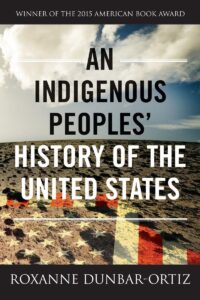NOTE: THIS WEBSITE IS A WORK IN PROGRESS. RESOURCES AND DATA ARE ADDED DAILY.
IMPORTANT: We are in urgent need of funding to keep this project alive and ensure its future. If you’re enjoying the site and see our vision for the project, please consider contributing to the Melungeon Roots crowdfunding campaign today. It is only with your help that we can continue this work. MORE INFO / DONATE
Thanks so much for your support! – Jes
![]()
An Indigenous Peoples’ History of the United States
share:
Some buttons on this page link to external websites. If you visit one of our affiliate sites and make a purchase, I may receive a small commission at no extra cost to you. More info
- UPDATED: 6.17.2025
- American history, Indigenous history, history
author:
Roxanne Dunbar-Ortiz
editor:
n/a
publisher:
series:
date:
8.11.2015
ISBN:
9780807057834
pages:
312
notes:
contents:
description:
Today in the United States, there are more than five hundred federally recognized Indigenous nations comprising nearly three million people, descendants of the fifteen million Native people who once inhabited this land. The centuries-long genocidal program of the US settler-colonial regimen has largely been omitted from history. Now, for the first time, acclaimed historian and activist Roxanne Dunbar-Ortizoffers a history of the United States told from the perspective of Indigenous peoples and reveals how Native Americans, for centuries, actively resisted expansion of the US empire.
With growing support for movements such as the campaign to abolish Columbus Day and replace it with Indigenous Peoples’ Day and the Dakota Access Pipeline protest led by the Standing Rock Sioux Tribe, An Indigenous Peoples’ History of the United States is an essential resource providing historical threads that are crucial for understanding the present. In An Indigenous Peoples’ History of the United States, Dunbar-Ortiz adroitly challenges the founding myth of the United States and shows how policy against the Indigenous peoples was colonialist and designed to seize the territories of the original inhabitants, displacing or eliminating them. And as Dunbar-Ortiz reveals, this policy was praised in popular culture, through writers like James Fenimore Cooper and Walt Whitman, and in the highest offices of government and the military. Shockingly, as the genocidal policy reached its zenith under President Andrew Jackson, its ruthlessness was best articulated by US Army general Thomas S. Jesup, who, in 1836, wrote of the Seminoles: “The country can be rid of them only by exterminating them.”
Spanning more than four hundred years, this classic bottom-up peoples’ history radically reframes US history and explodes the silences that have haunted our national narrative.
peoples:
CMOS:
author-date:
Other Resources
- The Seven Daughters of Eve: The Science That Reveals Our Genetic Ancestry
- Out of the Woods
- My Melungeon Heritage: A Story of Life on Newman’s Ridge
- The New Jim Crow: Mass Incarceration in the Age of Colorblindness
- Gibson Family Genealogy: A Melungeon Line
- The Farfarers: A New History of North America

